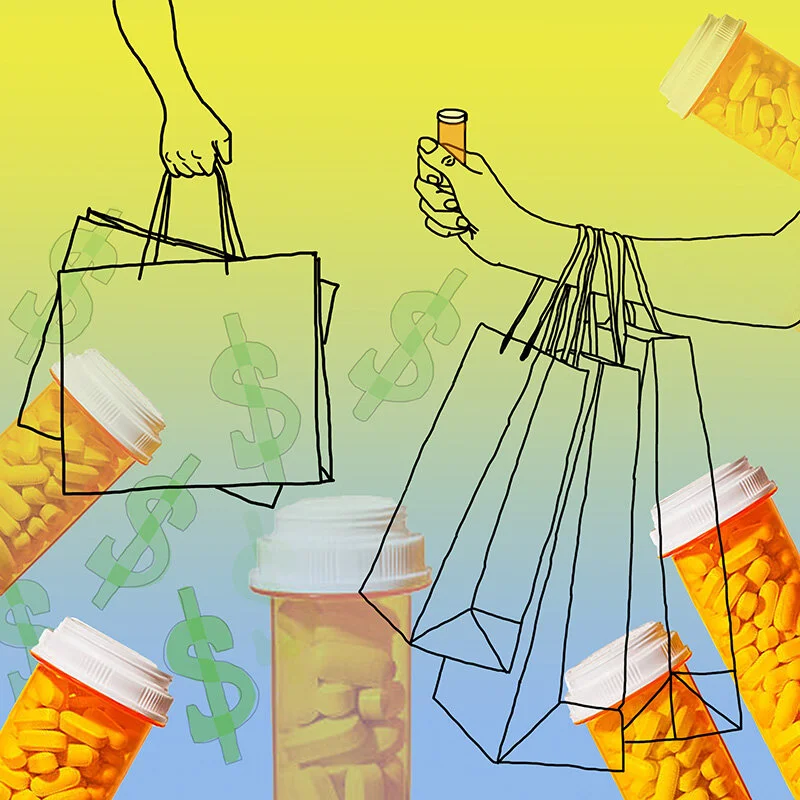The Drug That Makes You Spend All Your Money
Abilify treats depression, bipolar disorder, and schizophrenia, but it can also lead to compulsive gambling, shopping, eating, and sex.
By Jessie Schiewe
(Art: Kati Kirsch)
Last week, Fareed Khalil* bought a figurine for $150. The week before that, he spent a similar amount on a different collector’s item.
This wouldn’t be such a big deal if it was a one or two time thing, but the 22-year-old does it often. In the last 18 months alone, he’s purchased more than $4,500 worth of fun, but entirely unnecessary stuff.
And it’s not as if Khalil makes that much money to begin with. He’s a full-time college student who lives in New York City and works part-time for a nonprofit.
“I have an urge to buy superficial things,” he told OK Whatever in an email. “I basically spend everything I earn.”
But Khalil’s shopping compulsions aren’t entirely his fault. His medication makes him do it.
Abilify — also known by its generic name aripiprazole — is an antipsychotic drug used in the treatment of schizophrenia and bipolar disorder. It is also prescribed to help with depression, tic disorders, and autism, among other medical conditions.
First discovered by Japanese scientists in 1988, the medication was approved by the Federal Drug Administration in 2002, and by 2015, about 1.6 million Americans were being prescribed it. Within a year, the number of users had jumped to 5 million.
Abilify works by activating receptors in the brain that balance dopamine and serotonin levels, in turn leading to improved thinking, moods, and behaviors.
But the drug’s stabilizing abilities also come with some nasty side effects: namely, a lack of inhibition and impulse control with things that make us feel good.
It’s different for every person, but it usually manifests as over-shopping, overeating, reckless sexual behavior, or compulsive gambling.
Some people on Abilify are fortunate and never suffer the consequences, but a vast majority haven’t been so lucky. They have been driven to financial ruin from taking the drug, spending thousands if not millions of dollars gambling or shopping. Parents have lost custody of their kids after taking it. Homes have been foreclosed, leading once independent adults to move back in with their parents. The drug has also caused people to cheat on their partners, gain close to 100 pounds, and even turn to prostitution.
One woman who moved to Las Vegas in 1999 never partook in gambling, never even had a mild curiosity in it, until 2008 when she was prescribed Abilify for depression.
Once on the medication, she became hooked, betting away between $1 million and $2 million in less than five years, Fox News reports. One time, she missed not one but two flights in a row because she was too busy gambling on the machines at the airport.
The biggest issue with Abilify isn’t necessarily its side effects, though. Many medications treat one issue, but are known to exacerbate others.
No, the problem with Abilify is that the company that manufactures it never warned anyone about the drug’s side effects until it was too late.
The medication was on the market in the United States for 14 years before warnings about its ability to cause “pathological gambling” were added to its label.
Mentions of its other side effects — “compulsive or uncontrollable urges to...binge eat, shop, and have sex” — were added to the warning label later, and even then, only because the Federal Drug Administration required it.
To this day, a lot of people who take Abilify have no idea of its side effects. They’re also unaware that Bristol-Myers Squibb, the company behind it, is involved in a massive class action lawsuit. As of June 2019, more than 2,600 lawsuits had been filed against them.
I certainly wasn’t aware of any of this when I started taking Abilify in 2013 to treat depression. My psychiatrist never warned me of its side effects and still, to this day, has never brought it up or asked any questions about my impulse control since going on the drug.
In fact, I only learned about Abilify’s nefarious qualities last year, and even then, it was by chance.
I found a Reddit post titled “Compulsive buying and Abilify?” that had been written by Khalil. In it, he bemoaned the drug’s money-spending compulsions, but he also pointed out the many positive impacts it had had on his life. Clearly, he was torn.
“What should I do though?” he wrote. “I really don’t want to give up Abilify. If I go on another antipsychotic, I’ll have that shitty brain fog I’ve always had on them.”
I could commiserate with Khalil, because I, too, am a fan of Abilify, crediting it for helping me to wake up earlier and have more energy and clarity of thought.
But in the seven years that I’ve been taking it, I’ve also made a couple of ridiculous impulse purchases. And, back when I was single, I made some romantic decisions that I now, in retrospect, realize were rather reckless and unwise.
Still, compared to others, I’ve fared pretty well. This probably has a lot to do with my low dosage. Out of an allowed maximum of 30 mg a day, I take a mere 2 mg.
Khalil, on the other hand, was consuming 30 mg daily when he wrote that Reddit post — but he also takes it for different reasons than I. He suffers from bipolar disorder and a chronic sleep disability known as delayed sleep phase disorder (or DSPD) that Abilify is also believed to help treat.
When he was prescribed Abilify in the spring of 2018, Khalil was suffering with a lack of motivation, a low libido, and difficulty going to classes and completing his schoolwork. (It’s also worth noting that Khalil’s doctor did not warn him of the medication’s side effects prior to prescribing it for him.)
Like it had for me, the Abilify began working immediately for Khalil. It improved his concentration and gave him motivation like he “never had before.” Previously, he had taken a break from his studies, but after starting the medication he returned to his classes full-time and began earning high grades for the first time in years. He got hired for a job — his first — and started picking up new hobbies and making friends.
For Khalil, Abilify made him feel things that other antipsychotics he’d tried in the past hadn’t even come close to.
But it also came with a downside: It turned Khalil into a shopaholic. He began buying things he didn’t need, things he sometimes didn’t even have the money for and would instead just charge to his credit card.
“I had less control,” he explained. “I felt there was an internal need within me to buy.”
He’d find himself spending entire paychecks almost immediately after cashing them. He was constantly broke and, thanks to rampant use of his credit card, in danger of going into debt.
Desperate for a solution but not necessarily a switch from Abilify, he turned to Reddit where he posted the appeal through which I later found him. In response to his post, the Reddit community provided, if not advice, then at least validation of what he was going through.
“Looking back on my time on Abilify, that does sound familiar,” one Redditor wrote.
“I couldn't control spending and sugar cravings [when I was on it],” commented another.
They gave him suggestions, too. One person wrote “VISIT THE DOC” in all-caps. Others advised him to only use cash or to freeze his credit and debit cards in a block of ice.
I personally have found Pinterest to be a great source of help to avoid compulsive spending. Now, when I see something I want to purchase online, I “pin” it to my shopping board instead clicking “Buy.” Being able to gaze at photos of everything I want, in one cohesive, collected space, for some reason gives me almost the same satisfaction as owning the items.
In the end, Khalil discussed his compulsive spending habits with his psychiatrist and the pair decided he should switch to another medication that was similar but not the same.
He now takes 3 mg of a drug called Rexulti, or, as he calls it, “Abilify’s brother.” Like Abilify, it’s an antipsychotic that rebalances dopamine and serotonin levels in the brain, but it has milder side effects that are more easily controlled.
Despite the switch, Khalil’s shopping obsession isn’t entirely gone. Sometimes, when he’s stressed or hasn’t gotten enough sleep, the urge to spend recklessly can take hold of him. But at least now he’s aware of when those compulsions are most likely to happen and doesn’t feel so severely at the mercy of his whims.
Sometimes he slips up. Sometimes he buys something he doesn’t need or didn’t even really want in the first place. But now, when that happens, it’s OK.
It’s OK because Khalil has money now. He has a job — a job he believes Abilify helped him get and that Rexulti continues to help him hold down.
So yeah, Khalil could go off the drug and say sayonara to his spending compulsions as quickly as tomorrow if he wanted.
But that would also mean losing the other good things that the medications have provided for him, and right now, he’s just not sure if that’s worth it.









People are treating their ailments with black salve, an Edwardian-era paste that is not only gross, but dangerous.